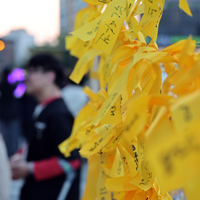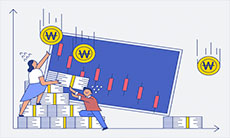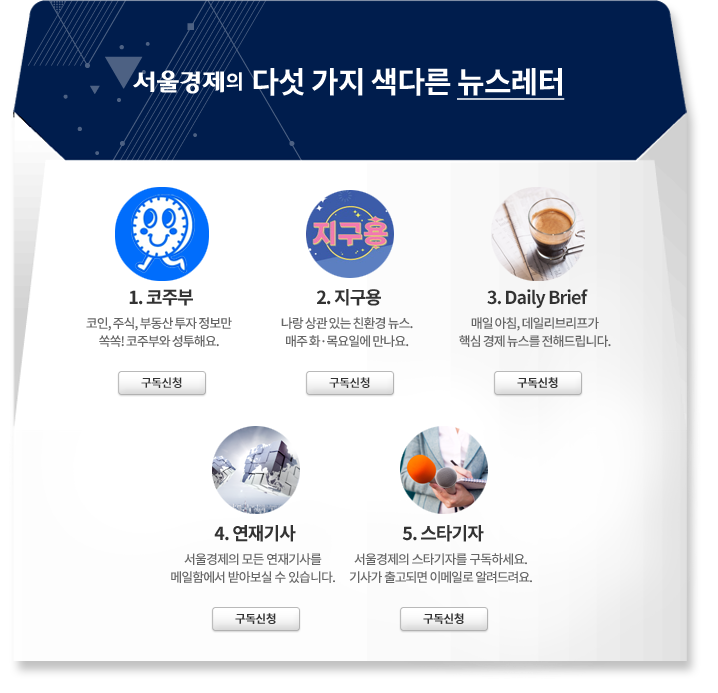< 저작권자 ⓒ 서울경제, 무단 전재 및 재배포 금지 >
[송현칼럼] 글로벌 금융네트워크 사라
입력2007-05-13 16:40:47
수정
2007.05.13 16:40:47
[송현칼럼] 글로벌 금융네트워크 사라
데이비드 전
대개 사람들은 통화에 대한 전망을 내놓으려 하지 않는다. 환율 변동의 임의성은 일반인들은 물론이고 금융전문가들마저 다루기를 꺼린다.
그러나 글로벌 금융시장에서 환율 변동에 대한 베팅은 분명 투자 결정에 가장 중요한 요소 중 하나다. 투자를 할 때 환율 영향을 무시할 수 없기 때문이다. 한국도 전략적으로 판단할 필요가 있다.
현재 한국의 일반투자가는 400억달러를 해외에 투자한 상태다. 한국은행은 3,000억달러의 외환보유액을 가지고 있다. 연기금, 보험사 및 기타 기관투자가들의 보유 달러도 이미 상당하고, 또 증가하고 있다. 그러면 한국이 어느 정도의 달러를 보유해야 하느냐가 직접적인 문제가 된다.
한국의 투자가 지금 어떤 상태인지 시뮬레이션을 해보는 것이 앞의 질문에 대답하는 한 가지 방법이 될 수 있다. 지난 1년 반 동안 달러화는 주요 통화바스킷에 대해 11%나 하락했다. 같은 기간 원화는 달러에 대해 같은 정도의 가치절상을 경험했다. 만약 10년 만기 미국 국채를 샀던 사람이라면 이 기간 동안 7%의 이자수입을 얻었다. 하지만 만약 헤지를 안 했다면 원화 기준으로는 같은 기간에 오히려 4%를 잃었을 것이다. 세계에서 ‘가장 안전한’ 투자처에서 4%의 손실률을 기록했다는 말이다. 한국의 해외투자 자금은 대개 헤지된다. 그래서 한국의 성적은 상당히 좋다. 그것은 11%라는 달러가치 하락의 재앙을 피했다.
다른 한 시뮬레이션은 잘못된 통화에 투자한 경우다. 한국은 대차대조표에서는 잠재적으로 11%의 수익을 남겼다. 하지만 환율 변동 위험에 노출됐거나 투자시 적절히 고려하지 못한 기회비용이 생겼다. 그것이 잠재적 이익을 갉아먹었다. 여기서는 한국이 별로 잘하지 못해 지난 1년 반 동안 350억~450억달러의 차액이 생겼다. 이것은 지난해 한국의 20대 기업의 총 순익보다 크다. 즉 해외투자 포트폴리오에서 환율 변동 위험에 대한 고려가 중요하다는 말이다.
앞으로 무엇을 해야 할지 생각해보자. 한국은 해외에 더 투자해야 한다. 그러면 어디에, 어떻게, 무엇에 투자할지가 고려해야 할 당면 문제다.
핵심은 환율 변동 위험성에 대해 더 선제적인 조치를 취하느냐 마느냐가 아니라 어떻게 그 일에 접근하느냐다. 한국에 하나의 쉬운 해답은 국제적으로 가장 눈치 빠른 통화투자가들의 네트워크를 사는 것이다. 물론 한국은 스스로 능력을 개발함으로써 글로벌 통화시장으로부터 이익을 얻을 수 있다. 그러나 이러한 능력이 세계적 수준으로 커질 때까지 그 경험과 지식을 구매할 수도 있다. 보수적으로 계산해도 환율 변동 위험을 회피함으로써 얻을 이익은 매년 100억달러에 이른다. 만약 한국이 10억달러를 투자하고 100억달러의 수익을 창출하는 조언을 받을 수 있다면 그 투자는 1,000%의 이익률을 기록하는 셈이다. 물론 이론적으로는 쉬운 결정이나 현실적으로 아직까지 이런 형태의 투자가 한국에서 매우 어렵다.
한국은 글로벌 톱 금융전문가의 네트워크를 구축하는 데 시간과 자금을 투자할 필요가 있다. 이런 네트워크로부터 한국은 많은 이익을 볼 것이다. 글로벌 시장의 ‘스마트머니’가 어디로 움직이는지를 미리 알아낼 수 있다는 말이다. 잠재적 해결책 및 장기투자를 위한 항구적인 틀을 발견할 수 있다는 것이다. 한국은 코치들을 필요로 한다.
한국의 적정 외환보유액이라는 처음 질문으로 돌아가보자. 만약 한국이 과거가 아닌 미래의 위험ㆍ이익 프로필을 생각한다면 한국은 지금 너무 많은 달러를 보유하고 있다. 외환보유액을 다변화해야 한다. 물론 달러 외 통화의 환율 변동 위험성에 대해서도 심사숙고해야 한다. 상품이나 다른 아시아 국가와 서방 선진7개국(G7)의 통화를 생각할 수 있다. 한국은 다른 나라 투자가들이 이익을 독식하도록 내버려 둬서는 안 된다. 포괄적인 해외투자전략의 일부로 한국은 다른 통화를 고려할 필요가 있다.
How much US Dollar should Korea Hold?
In many cases, people do not want to take a view on currencies. The randomness of the currency fluctuations is something that both finance professionals and average people do not want to deal with. Typically, people do not either think about it or hedge out the currency risk in making investment decisions. As an investor who actually makes investments in currencies around the world, the practice of taking the currency risk factor out of an investment decision in general is a good one for non-currency specialists. However, time to time in global financial market conditions, the currency bet in it of itself can be the most critical component of investment decision. Today's global investment conditions dictate that one cannot ignore the exchange rate component of investment decision making process. In fact, of everything we look at in 25 countries we invest in, the future behavior of currencies is the most confident view that we have. Korea needs to think about the currency exposure as a strategic decision rather than just ignoring it.
Recently, Korean retail investors invested about $40 billion dollars of money abroad. Also, the Bank of Korea holds about $300 billion dollars of international reserves. Including the pension funds, insurance companies and other institutional investors in Korea, their US dollar exposure is already meaningful and increasing. So the question at hand is how much US dollar should Korea hold? One way to begin answering this question is to run some simulations to see what would happen to Korea's investment under various conditions. In the past year and a half, the US dollar weakened 11% against a basket of other currencies. During the same period, the Korean won appreciated about the same amount against the US dollar. Using a 10 year US treasury yield as a proxy, one would have earned about 7% interest income during this period. If unhedged, this investment would have lost about 4% during the same period from the Korean won perspective. In the world's "safest" instrument, one would have lost 4%. Of all the money that is investing abroad from Korea, most of it is hedged. So the scorecard for the Korean money investing abroad is fairly good. It avoided the 11% decline in the dollar.
Another simulation is that by investing in the wrong currency, Korea left potential 11% return on the table. This to me is the opportunity cost of avoiding the currency exposure or consideration of investing. It ignores potential gains. On this regard, Korea did not do so well. The net difference over the past year and a half is huge. It is about $35 to $45 billion dollars. To put this amount in context, it is greater than the net profit of the top 20 listed companies in Korea in 2006. Currency exposure consideration on portfolio investment abroad is important for Korea.
Just like anything else, looking back with a hind sight and formulating a precise strategy to extract maximum return is interesting but not necessarily a practical exercise. Let's talk about what to do going forward. At the country level, Korea is beginning to invest more abroad. As the balance sheet improvement at the country level creates a higher "cash" savings, it will become necessary for Korea to invest more abroad. Where to, how to and what to invest will be important. One of the factors Korea chooses to ignore up to now has been the currency consideration. As Korea becomes a bigger player in global financial markets, it can no longer afford to not to consider the exchange rate as a proactive investment decision factor. A simple exercise earlier demonstrated that the opportunity cost of not considering it can cost Korea a considerable amount of wealth that is equivalent to income that top 20 companies in Korea will have to work hard for one year to generate.
The key question is not whether to take a more proactive currency risk or not but how Korea should approach this task. One easy way to develop a framework to take on more active currency exposure for Korean investments going abroad is to buy the network of world's most astute currency investors. Of course, Korea can develop its own ability to navigate and profit from the global currency markets but until this ability rises to a world class level, Korea can buy the experience and knowledge. Conservatively, let's say that the gains from the currency risk taking can be about $10 billion per annum at the country level. If so, Korea should be ready and willing to invest considerate amounts of money to help take on more global currency risks. Just as an example, if Korea invests $1 billion US dollar and get advises on how to generate $10 billion in gains, the investment is generating a 1000% return. This in theory should be an easy decision. In reality, this type of investment is very difficult in Korea.
One practical consideration for Korea is to invest time and money in developing the network of top global financial players. From this network, Korea has much to benefit. It can learn about where the "smart money" on the global market place is looking to move their money to instead of learning after the move takes place. It is in this regard, Korea can find a potential solution and a permanent framework to make long-term investments in global markets. Korea needs coaches.
Oh, by the way, going back to the earlier question about how much US dollar Korea should hold? If Korea considers not the historical but the future risk/return profile of the US dollar, then Korea is probably holding too much US dollar currently. It needs to diversify away from the dollar and should consider taking on the non-dollar currency risk. Using this logic, one can think about investing in commodities, other Asian currencies, other G7 currencies than the US dollar. Korea should not be leaving such opportunity cost for investors from other countries to benefit. As a part of a comprehensive outbound investment strategy, Korea needs to take on more currency consideration.
입력시간 : 2007/05/13 16:40

주소 : 서울특별시 종로구 율곡로 6 트윈트리타워 B동 14~16층 대표전화 : 02) 724-8600
상호 : 서울경제신문사업자번호 : 208-81-10310대표자 : 손동영등록번호 : 서울 가 00224등록일자 : 1988.05.13
인터넷신문 등록번호 : 서울 아04065 등록일자 : 2016.04.26발행일자 : 2016.04.01발행 ·편집인 : 손동영청소년보호책임자 : 신한수
서울경제의 모든 콘텐트는 저작권법의 보호를 받는 바, 무단 전재·복사·배포 등은 법적 제재를 받을 수 있습니다.
Copyright ⓒ Sedaily, All right reserved














































